Bible Study Strategies Lesson 5
Followers of the Messiah - How to use Biblical Study Tools
Remember, no translation can be considered totally reliable.
When you really want to know what the passage says, I believe that you’ll have to do a lot of comparison shopping.
Let me explain, by examining the possible meaning of a single Hebrew word in a verse using at least two biblical dictionaries or lexicons.
Let’s check the idea that, there may have been a mistranslation in Exod 20:7, by examining just one Hebrew word, לשׁוא, l’shav, H7723.
For this step, I’ll demonstrate how to use e-Sword, & Biblehub.com, however, we could use any of the biblical tools shown in Lesson 4.
I'll begin by using e-Sword
Open the e-Sword software – again, a window like the one below will appear.
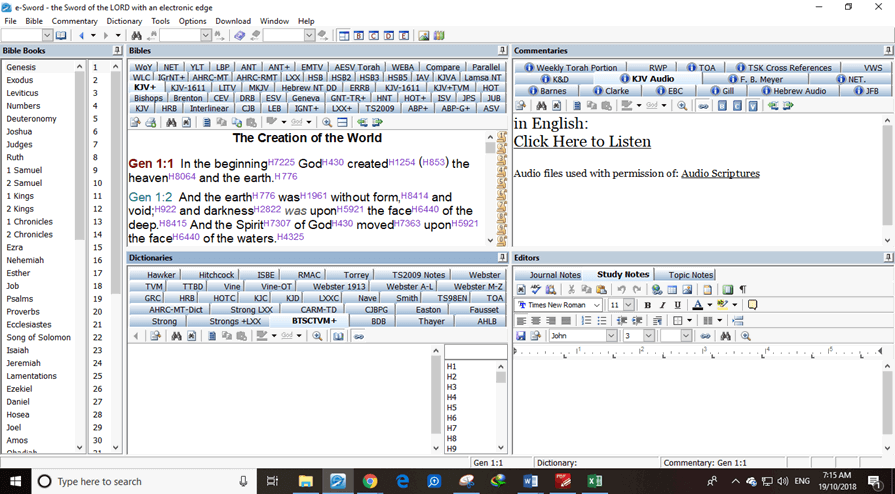
Click the B tab on the top line to maximise the Bible version that is displayed. Since I have the KJV+ version checked, that translation will appear as shown below.
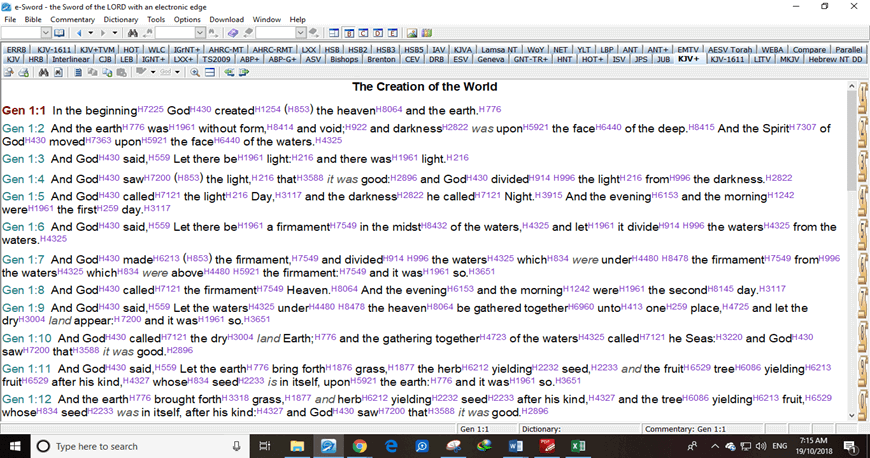
To load the Hebrew-English Interlinear version, click the Interlinear Button, & it will load as shown below. Hebrew reads "right to Left".
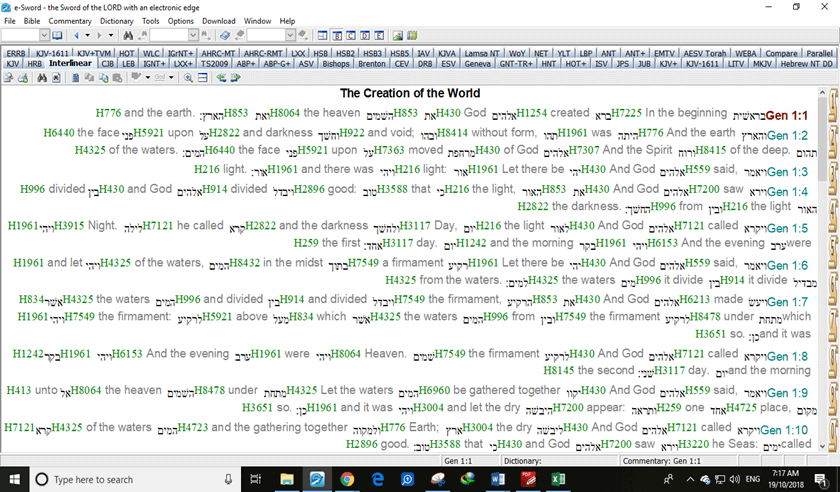

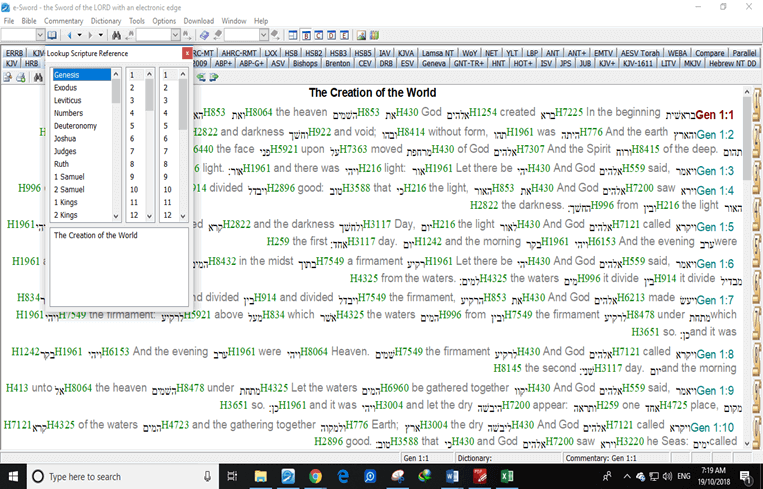
Click on Exodus in the first column, then scroll down to chapter 20 in the 2nd column, & then verse 7 in the 3rd column – it will look like this.
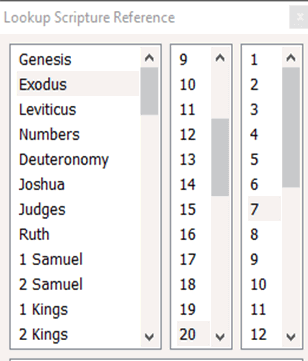
When you click on the verse number, “7” in this case, the Hebrew-English Interlinear opens at that verse as shown. The highlighted verse is shown in a brown colour as shown.
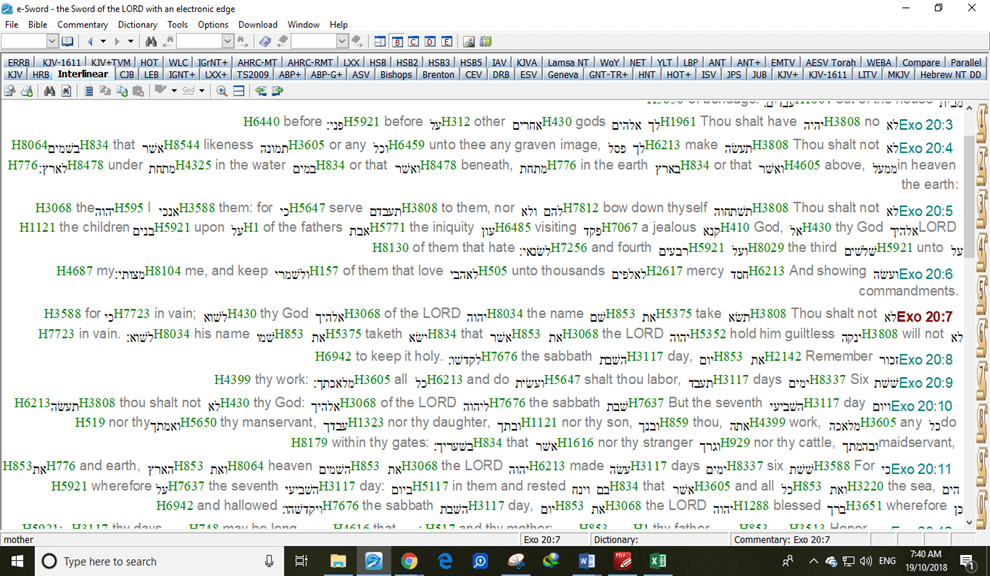
The Hebrew word translated as “in vain” is H7723. If I click on Strong’s number H7723, the following window opens.
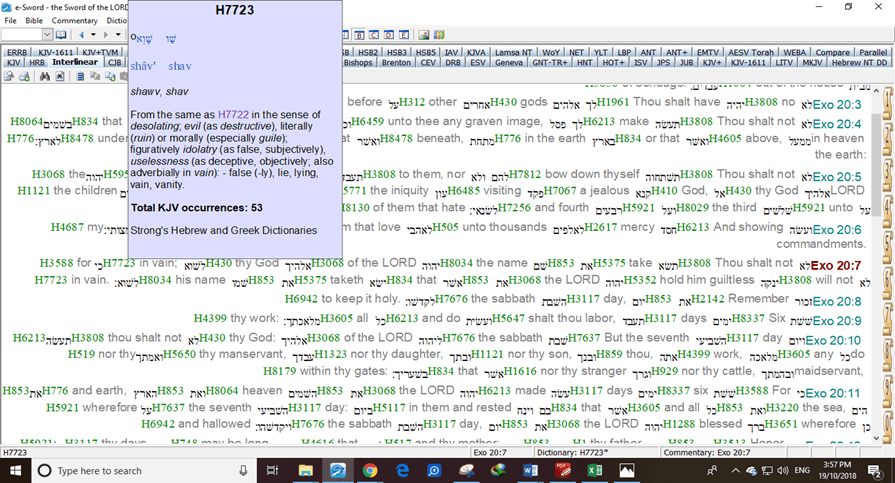
Please read it carefully, focusing on the words in italics (desolating, evil, destructive, ruin, guile, idolatry, uselessness, & vain). I believe these are the possible meanings of the ROOT word, shav.
NB - I never trust just one concordance or dictionary, so I always check at least two, & I encourage you to check at least two, as well.
I usually use e-Sword to examine another dictionary, namely, the Brown-Driver-Briggs Lexicon, but since I want to demonstrate how to use Biblehub.com, I’ll open it below.
Again, when we go to the Internet, & type in www.biblehub.com, we get :
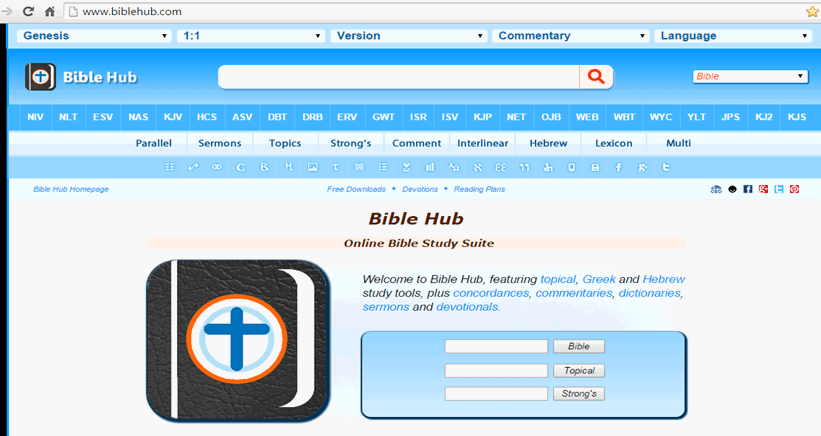
If we click the Interlinear tab, the following window opens :
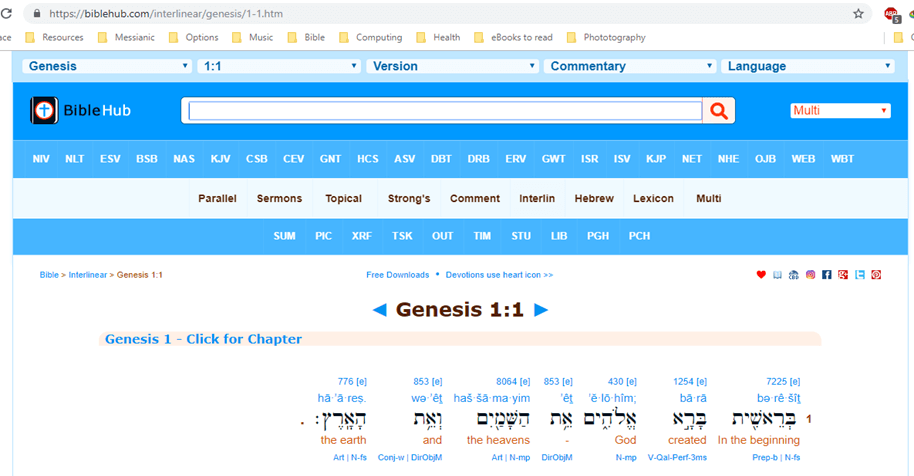 If we type in Exodus 20:7 at the top, we get :
If we type in Exodus 20:7 at the top, we get :
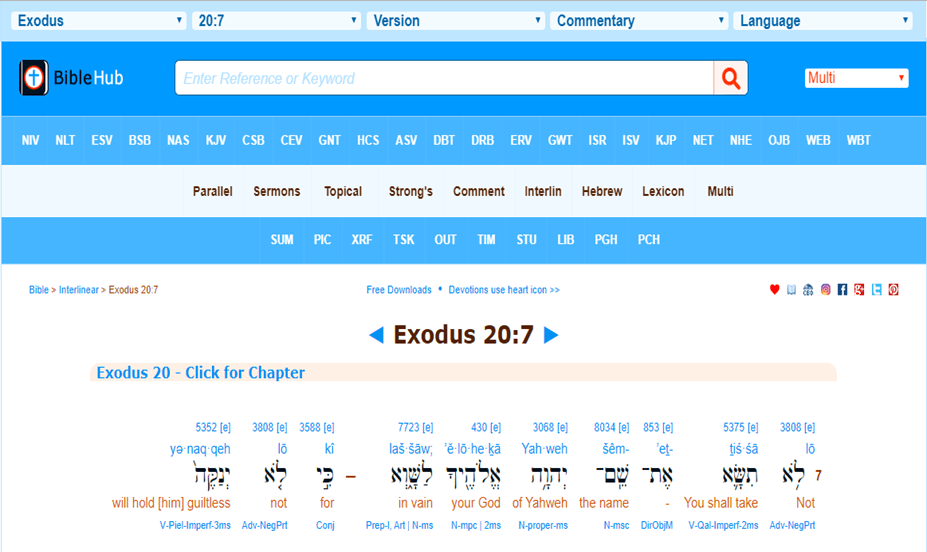 If we scroll down, we can view Exod 20:7 fully as shown :
If we scroll down, we can view Exod 20:7 fully as shown :
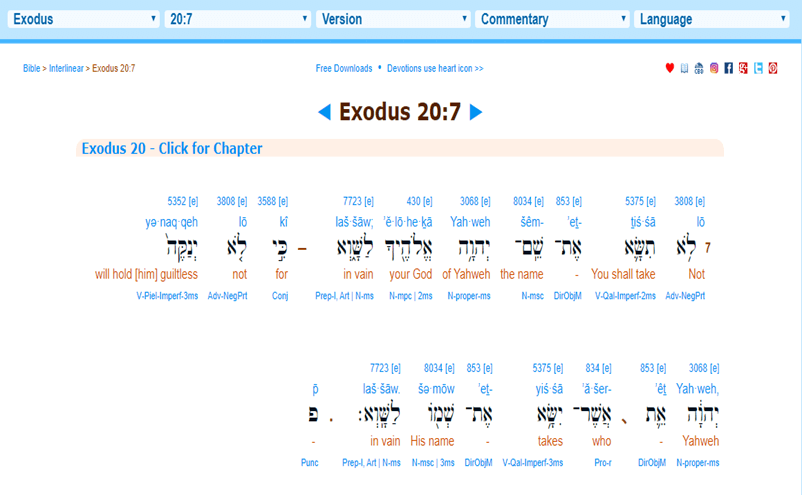
If we click Strong’s number H7723, we are taken to the following window :
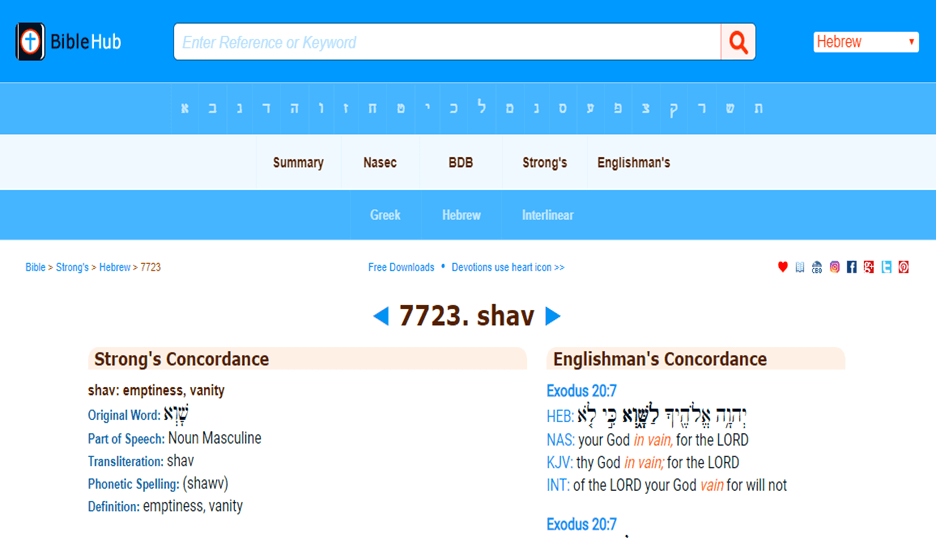 While this window contains a lot of useful & interesting information, for now, let’s click the BDB tab
While this window contains a lot of useful & interesting information, for now, let’s click the BDB tab
(the Brown-Driver-Briggs Lexicon) – where the following information is displayed :
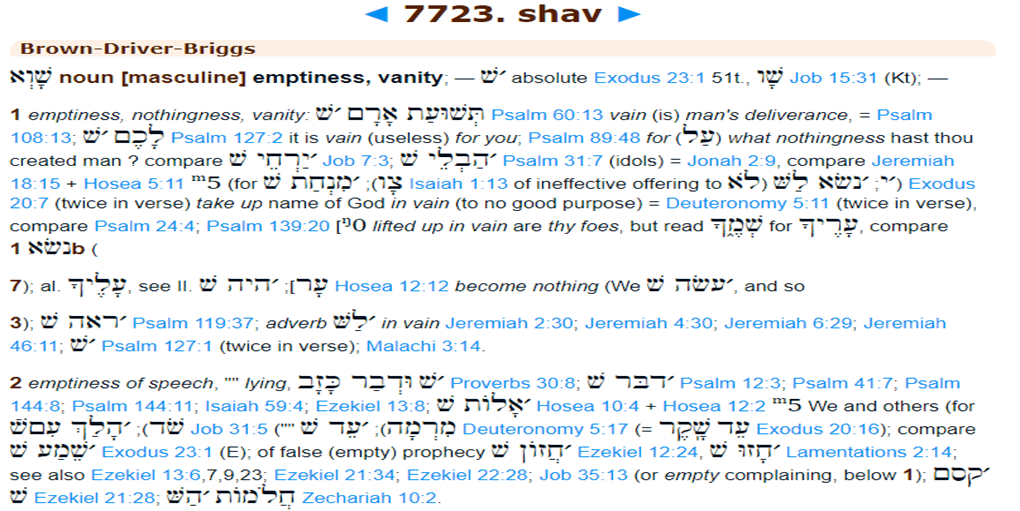

As you can see, there is a lot of information provided here. For now, let’s just focus on the three main points written in italics :
1 emptiness, nothingness, vanity
2 emptiness of speech, lying
3 worthlessness
I used BibleHub.com to demonstrate how to use it, but I usually just use e-Sword because :
(a) it is really easy to find the information I am looking for, &
(b) I don’t need to access the Internet.
In using e-Sword, I generally copy the details of Strong’s Concordance, & the Brown-Driver-Briggs Lexicon in a table like the one below :
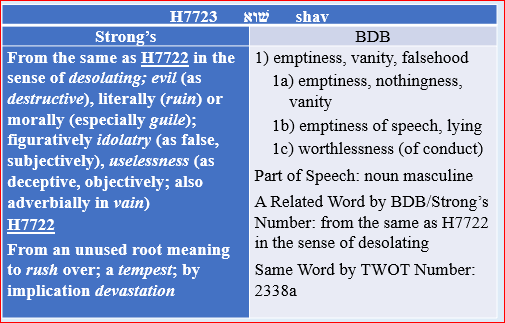
Again, please note that the words in italics, give the most literal meanings of the Hebrew word being studied.
Summary
The Hebrew word that is translated “in vain”, is לשׁוא, l’shav, comes from the ROOT word, שׁוא shav, which can mean,
emptiness, nothingness, vanity, lying, worthlessness, falsehood, desolating, evil, ruin, or uselessness.
The prefix ל, at the beginning of the Hebrew word, שוא shav, can mean “for, to, or at”, but has been translated as “in” vain, in the KJV, HRB, CJB, & the Hebrew-English Interlinear, & but “lightly”, in the CJB.
Q: Which meaning is most correct for l’shav, in Exod 20:7 ?
A: I believe that in this verse, the translators of The Scriptures & the LEB have the correct sense of this verse, namely, “not bringing the name of Yahweh to naught (nothingness)”.
Now to the "Context".
Q: What is the context of this specific verse within Exod 20 ?
A: Again, my research shows me that the Book of Exodus was originally written by Moses TO the now free Israelites, sometime during their 40 years in the wilderness. Exod 20 follows Exod 19, where Moses reminded these free Israelites in Exod 19:5-6, of the covenant Yahweh offered to them, & that they accepted.
Exod 20 is the start of what Yahweh required of Israel, as the conditions for being in Covenant with Him. The whole set of requirements, Yahweh’s Torah (instructions), commandments, judgments & statutes are written from Exod 20 to Exod 24:11, but I believe that all of the first five books of the Bible, also known as Yahweh’s Torah, are Yahweh’s instructions to His people, Israel.
Exod 24:4 reminds these free Israelites that Moses wrote ALL the words of Yahweh in the Book of the Covenant (v7).
After you have completed your study of a verse, the next step is to re-write it by inserting clarifying words based on the correct context. The following is an example of how this might look.
Exod 20:7
Thou shalt not take (bring) the name (reputation) of the LORD thy God (Yahweh your Elohim) in vain (bringing it to naught); for the LORD (Yahweh your Elohim) will not hold him guiltless that taketh his name in vain (bringing it to naught).
NB – it is strongly recommended that you carefully check the translations of any abstract words such as love, grace, faith, or salvation, by examining their meaning in the original languages, as well as establishing their correct context.
While the above information has been based on studying just one Hebrew word, the same principles can be applied to a study of a whole verse, and/or passage.
Importance of knowing something about the Hebrew
Example
Q: Have you ever wondered why the story of the tragedy of Joseph, where the eleven brothers sold him off into slavery (Gen 37:12-36), is seemingly taken on a “detour” ? In this “detour”, we peer into the sexual escapades of Judah’s two sons, and Judah himself with Tamar.
A: Well, the answer is completely lost when reading it in English, but in Hebrew, the reason is quite obvious.
Let’s have a closer look at that “detour” story.
If we look at Gen 37:32 in an English translation such as the KJV, it reads :
Gen 37:32 And they sent the coat of many colours, and they brought it to their father; and said, This have we found: know now whether it be thy son's coat or no.
The Hebrew-English Interlinear translates Gen 37:32 as follows :

The important Hebrew word for this example is H5234, הכר ha’kar, translated as “know” in both the above versions. Strong’s tells us that it can mean scrutinize, recognize, acknowledge, be acquainted with, respect, revere, suspicion, disregard ignore, reject, resign or dissimilate. In this context, it probably means “recognize”.
In the “detour” story, Gen 38:1-26, we are told that Judah impregnates Tamar, who is disguised as a temple prostitute, & that later, she presents herself, obviously pregnant, to the chief of the tribe - Judah. He, of course, is outraged. In Gen 38:25, we are told that Tamar offers the articles that will identify the father of her child, & provides the signet, bracelets & staff, of the child’s father.
Gen 38:25 When she was brought forth, she sent to her father in law, saying, By the man, whose these are, am I with child: and she said, Discern, I pray thee, whose are these, the signet, and bracelets, and staff. (KJV)
In the Hebrew- English Interlinear, it reads :

If you look carefully at the Hebrew words used in this verse, the Hebrew word, translated as “discern”, is H5234, הכר ha’kar; the same Hebrew word, Judah used to deceive his father Jacob, in Gen 37:32.
So, thinking about these two seemingly, unrelated stories, we can now see that the original intention of Moses the author, was to show the connection between the way Judah deceived Jacob about Joseph, & how Judah is reminded of this deception by Tamar’s plea to him.
Once Judah deals with this deception trauma, the Joseph story can continue.
Exercises
1: Use the above method to examine & study Lev 23:3
Q: What is a sabbath of rest ?
Q: What is a holy convocation ?
Q: What is the difference between the work done for six days & the command “you shall do no work” ?
2: Choose a Bible verse of your own, & study it using the method above. Write down any differences that you observe, & attempt to explain why they are there.
3: In Genesis 1:1, there is a Hebrew word that is not translated. What is this Hebrew word ? Think about this word, & write down some thoughts about it. Is this word untranslated anywhere else in the Tanach (OT)?